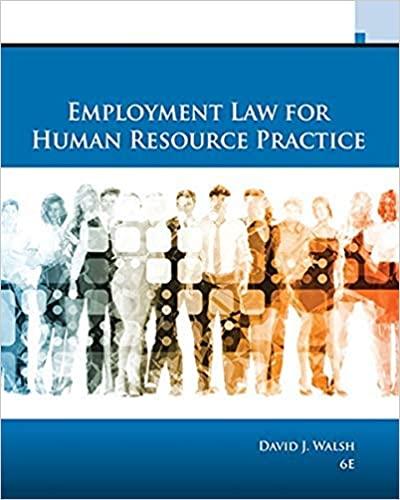DeMasters worked as an employee assistance program (EAP) consultant for Carilion. In this role, he reported employee
Question:
DeMasters worked as an employee assistance program (EAP) consultant for Carilion. In this role, he reported employee complaints to Carilion’s human resources department. In late 2008, John Doe, a Carilion employee, consulted DeMasters regarding his manager’s sexually suggestive behavior. After listening to Doe’s complaints of harassment, he had Doe sign a release enabling him to communicate directly with Carilion’s human resources department on Doe’s behalf. DeMasters reported Doe’s complaints to the human resources department, which prompted Carilion to investigate the allegations, and ultimately led to the termination of Doe’s manager. Following his termination, Doe continued complaining to DeMasters regarding continued harassment he received from co-workers supporting his recently terminated manager. DeMasters contacted Carilion’s human resources department to inform them of Doe’s continued complaints of harassment. During a subsequent conversation with the human resources department, DeMasters stated his belief that Doe’s complaints were being handled improperly. Following this conversation, DeMasters did not communicate with Doe and was unaware of the legal remedies Doe has pursued against Carilion. A few years later, a manager for Carilion called DeMasters to inform him that Doe had filed a complaint against Carilion based on alleged violations of Title VII’s anti-retaliation provision. During the conversation, the manager questioned DeMasters regarding his involvement with Doe’s complaints of harassment. The manager stated that Doe and Carilion settled their claim prior to trial. Shortly thereafter, a few high-ranking human resources professionals called DeMasters into a meeting, during which they questioned him regarding his involvement with Doe’s complaints. They asked DeMasters why he had not taken a pro-employer position and also told him that he left
Carilion “in a compromised position.” Two days later, DeMasters was fired for failing to act in a manner consistent with the best interests of Carilion. DeMasters filed a complaint against Carilion in federal district court, alleging that Carilion violated Title VII’s anti-retaliation provision. In response, Carilion filed a Motion to Dismiss, alleging that DeMasters had not properly alleged a prima facie case under Title VII’s Opposition Clause. The district court granted Carilion’s Motion to Dismiss and DeMasters appealed.
1. What were the legal issues in this case? What did the appeals court decide?
2. Which actions were taken by DeMasters? Why did they constitute protected activity under Title VII?
3. What is the “managerial rule”? What is the argument for having such a rule? Is that argument at all convincing? Why does the appeals court decline to apply the rule in this case?
4. This decision focuses on the first element of a retaliation claim—whether the plaintiff engaged in protected activity. Would the other elements of a retaliation claim be satisfied? Why or why not?
5. What are some practical implications of this case for human resources managers?
Step by Step Answer:






